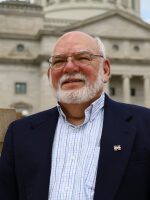From the Arkansas Advocate:
The Arkansas State Board of Election Commissioners on Wednesday authorized election integrity reviews for Pulaski and Izard counties.
The board also voted unanimously to decertify all three members of an unnamed county’s election commission after hearing the results of its staff’s investigation of complaints about the 2024 general election. The board doesn’t name counties when levying sanctions until the affected county and individuals have an opportunity to respond and either accept or challenge the proposed sanctions.
State law allows the board to conduct election integrity reviews in the odd-numbered years following an election. The board can choose the counties randomly or by a two-thirds vote if it has received information a substantial violation of election or voter registration laws has occurred.
The board issued a letter of reprimand earlier this month to Pulaski County Clerk Terri Hollingsworth over violations of state election law during early voting last year. A deputy clerk changed the street addresses of 132 voters in a precinct file without authorization, according to the SBEC letter. Other clerk’s office employees caught the changes two days later but not before four voters had cast the wrong ballots. The employee resigned shortly after the incident, the letter says.
Unauthorized changes to voter records are considered a felony under A.C.A. 7-1-104, and the SBEC referred the matter to the Pulaski County prosecutor and the attorney general’s Election Integrity Unit.
The SBEC also issued a letter of warning to the Pulaski County clerk for failing to prevent unauthorized changes to voter records.
The election integrity reviews approved by the state board Wednesday will seek to identify errors and any evidence of fraud in voter registration records and absentee voting documents as well as verify the accuracy and integrity of election results, according to ACA 7-4-124.
No specific mention was made about the reason Izard County will be the subject of an election integrity review, but the board voted at its December meeting to refer complaints from election monitors to SBEC staff for investigation.
Decertification of election officials
Separate votes by the seven-member SBEC mean the chairman of the unnamed county’s election commission won’t be able to work in an official election role for 14 years and the other two commissioners for eight years.

SBEC Director Chris Madison said it would be up to the respective county political party committees to appoint new members to the election commission if the sanctions are accepted. County election commissions are composed of three members, two from the majority political party and one from the minority party.
County election officials were the subject of six complaints to the state board, including two that referred to a hostile environment created by the election commission chair and poll supervisors toward poll watchers.
The allegations included “hostility and [an] overall lack of professionalism in dealing with poll watchers” and a failure by the chair and poll supervisors to “recognize the rights and responsibilities of the poll watchers, thereby preventing the poll watchers from performing their duties,” SBEC legal counsel Waylan Cooper said.
Cooper said the investigation found evidence supporting the allegations, including an incident when the county commission chairman called sheriff’s deputies to remove a poll watcher after the poll supervisor tried to prevent the watcher from sitting in a chair that allowed a full view of the voting process. The chairman also raised his voice while telling poll watchers they were being ejected from the location, intimidating at least one potential watcher from participating further, Cooper said.
“The hostility toward poll watchers later spread” to another voting site in the same city on Election Day, Cooper said, when a disagreement between the poll supervisor and a poll watcher led to the supervisor’s husband, who was also a poll worker, verbally accosting the watcher with profanity and telling the watcher to leave.
“The backstory is that there’s two political factions in this community, and the election officials are on one side of a local issue and the poll watchers on the other,” Madison told the board.
Madison made a similar remark about Izard County during the board’s December meeting: “[Izard County] has a city that has two very engaged factions, and Hatfields and McCoys kind of comes to mind.”
“They have to be professional and adult enough to put aside that they don’t like the people who are poll watchers and allow them to do their jobs,” SBEC member Sharon Brooks said. The law requires it and their training demands it, “and they’re not doing that,” she said.
The board voted unanimously to decertify the supervisor and her husband for four years. Madison noted that the couple has since moved to another county and Clemmer’s motion applies statewide.
Regarding the allegations against the county commission chairman, SBEC member Bilenda Harris-Ritter said, “I think it’s unconscionable that the chair of the election commission is behaving like this … and encouraging other officials to behave like this.”
Harris-Ritter offered the motion to decertify the commission chair for seven two-year federal election cycles, the maximum the state board can impose.
Madison said the action was appropriate “to help solve some problems up there.” The SBEC staff will be intimately involved in the county’s election processes going forward, he said.
The board voted separately to decertify the other two members of that county’s election commission over a complaint that the commission didn’t deliver provisional ballots to the clerk and secretary of state until a week after the deadline. Unlike in many Arkansas counties, the clerk there is not the election coordinator; another member of the election commission is the coordinator.
In another case, the board voted to decertify an election commissioner in a different county for 14 years over his failure to show up on time to open a polling place at the start of early voting. Board members in support of decertification noted similar issues had happened in previous years.



